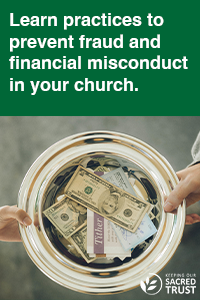I confess to a complicated relationship with wealth. When I was in college, I thought of money as the “root of all evil.” I even asked the older brother of a dear friend how he could possibly go to business school, since all businessmen were motivated only by greed! (OK, I was young and idealistic.)
But my problem with money goes deeper, much deeper. Early on in my marriage, my husband discovered that I was extremely averse to asking others for money or anything else. Even asking our neighbors, whom I really liked, for a simple cup of sugar filled me with dread. It wasn’t until clinical pastoral education that I realized why. During the Depression, my grandfather embezzled money for his family and went to prison. As a result, my family never ever talked about money. Neither did my family ever talk about Grandpa’s going to prison. As a consequence, asking for sugar, much less money, felt sleazy. And I know that many other church leaders find talking about money really hard, even though they don’t have my particular family history.
I am a second-career pastor and worked in the government and business world for 27 years before answering my call to ministry. At my first appointment, at a small church of 40-50 in worship, I discovered that there was no habit of financial discipleship. God blessed me by sending me a lay person who was passionate about teaching people to become good financial stewards of what the Lord had given them. He took up the challenge of creating our first stewardship campaign. But I still had to overcome my fears of talking about money, perhaps even for four Sundays in a row! How would I stand up in front of the congregation and “make the ask” when even thinking about it gave me the creeps?
Then I read a small volume by Henri Nouwen: The Spirituality of Fundraising. Nouwen says that if you are really passionate about something — about a cause, about Jesus, about your faith community — then inviting others to give money to it is a gift to them. This simple thought began to move me from a mentality of scarcity to a mentality of abundance.
Henri Nouwen says that if you are really passionate about something — about a cause, about Jesus, about your faith community — then inviting others to give money to it is a gift to them.
In my five decades before becoming a pastor, I had experienced people who approached me for donations in the spirit of Henri Nouwen, and that felt good. I remember being on the board of my small college and watching how the top development officer for the college cultivated donors. He always began with building a relationship. He took time to learn what a person was interested in, what he or she cared about. When I lived in Houston, Texas, my church taught me about tithing and generous giving. I recall being invited to a nice meal at the pastor’s home. We shared conversation around the table, and a few lay people stood up and spoke about how the church had transformed their lives and how they had grown in their financial faithfulness. My husband and I looked at each other and thought that perhaps we should be giving more. We believed that we were being invited into something that was making a difference, and our hearts grew larger.
As a new pastor, I wanted to be an authentic person who, like Christ, invited people into “new life in Christ.” I wanted to lead my congregation into experiencing the joy of extravagant generosity. As I prayed and wrestled with scripture about wealth, I came to believe that God was calling me to certain habits about wealth and money in the congregation:
- I must not only tithe, but go beyond tithing — and let my congregation know that I “walked the talk.”
- I needed to partner with my laity in inviting the congregation to develop generous habits because lay testimony is often more credible than a pastor’s appeal. When I announced that everyperson in leadership in the church had made a financial commitment, it was powerful. But what melted everyone’s heart was hearing from a woman who had lost her job and was on unemployment say that she was giving ten percent of her unemployment check to the church because everything that she had came from God!
- Our invitations need to stress the Christian’s “need to give” rather than the “church’s need to fund the budget.”
- And, most difficult for me, I had to master my family history and find comfortable and authentic ways of “making the ask” face-to-face, one-on-one.
I wish I could tell you that I have mastered all of my issues with money. But I can’t. But I will say that as I read and re-read the story of the rich young man, which used to terrify me, I now notice that in Mark’s telling of the story, Jesus loved the young man. Even him. So if Jesus could love this young man who so desired eternal life, but was unwilling to give up all that he possessed, then perhaps Jesus loves even me.
This article is adapted from a reflection Cathy offers in the collection entitled In the Shade of the Sycamore Tree: Ministers Reflect on the Subject of Wealth (Intermundia Press, 2015), edited by J. Robert Moon. The book is available at Amazon.com.
Related Resources:
- Tell Your Stewardship Story by Margaret J. Marcuson
- Yours for the Asking by J. Clif Christopher






